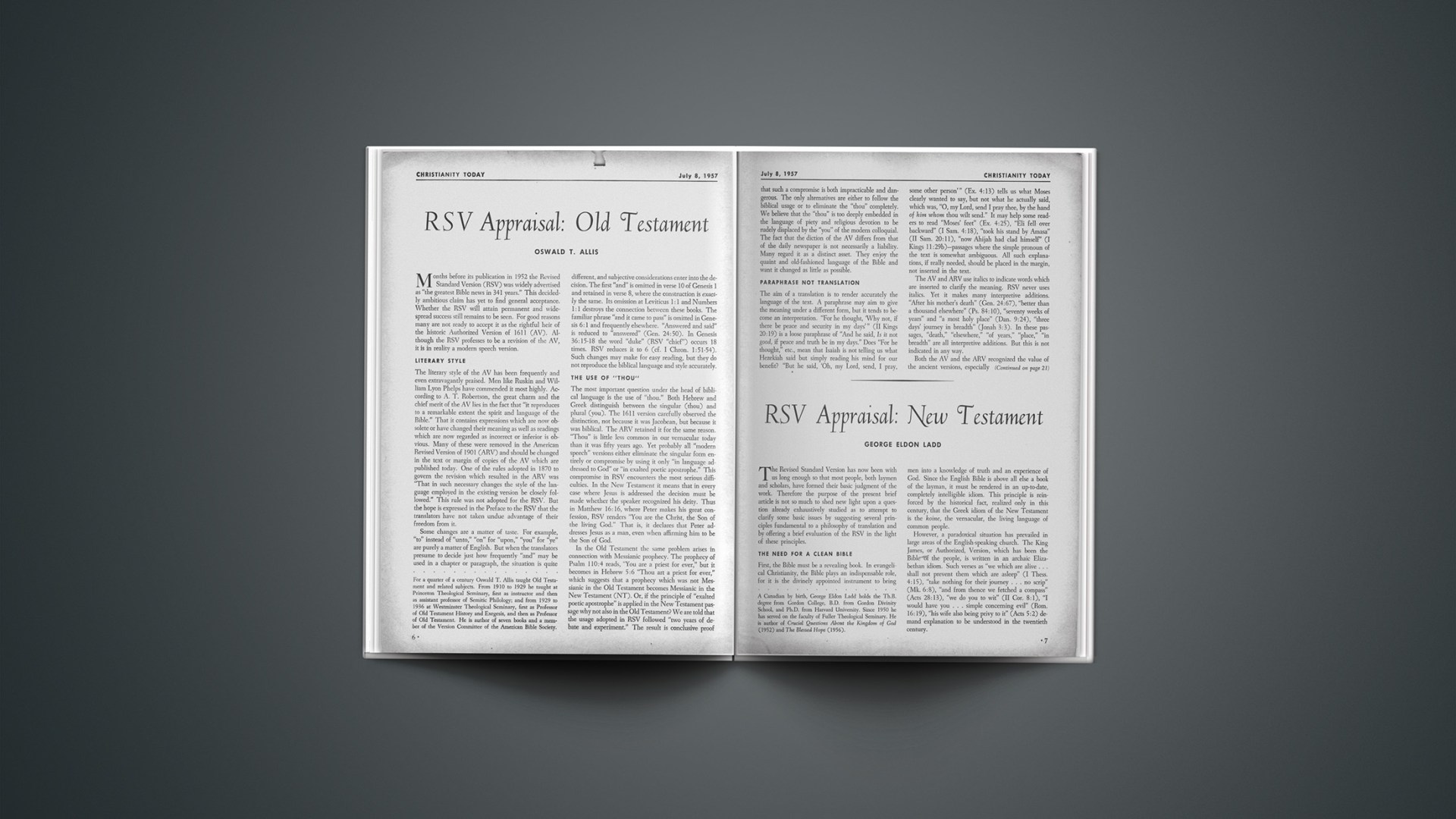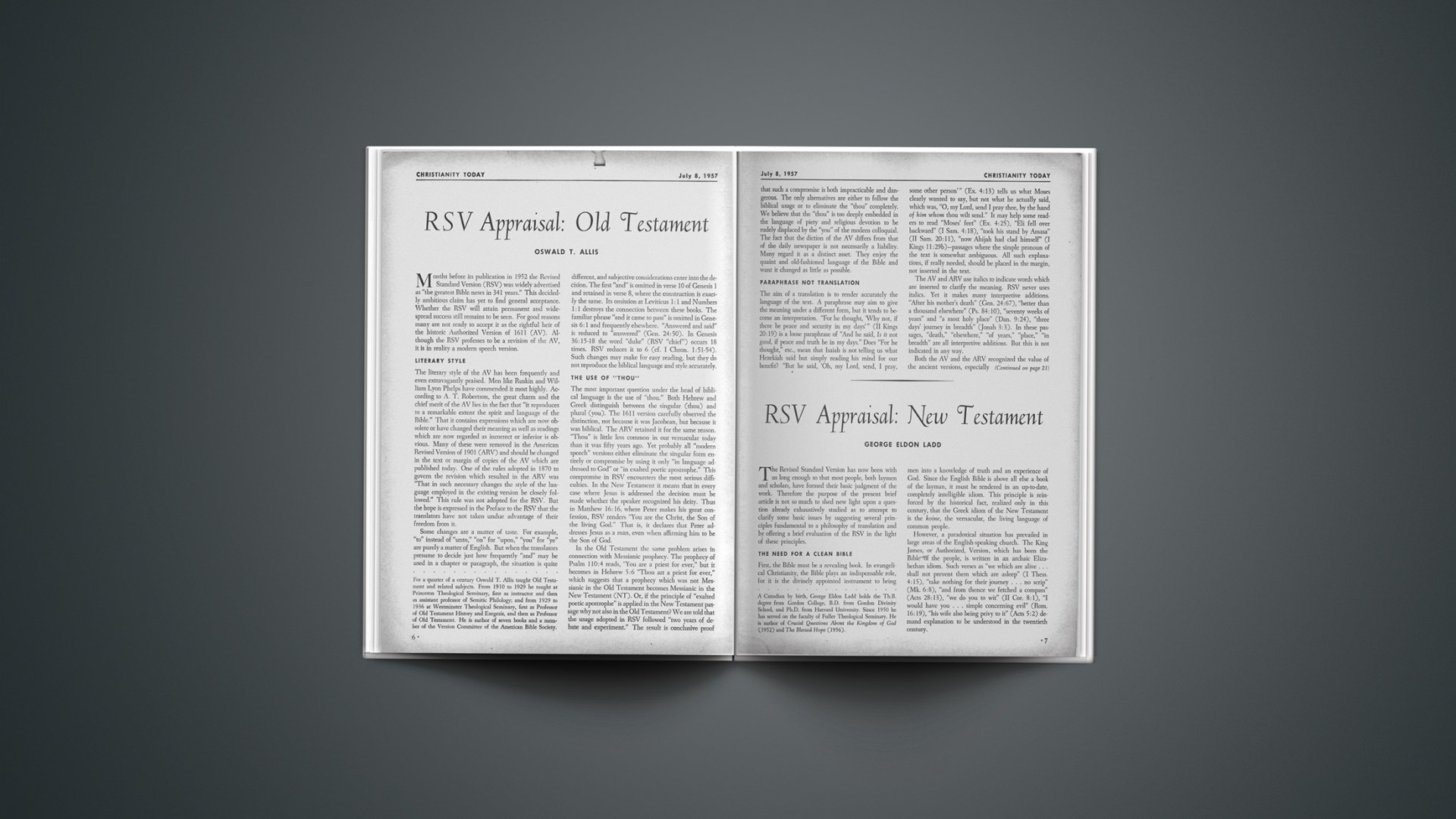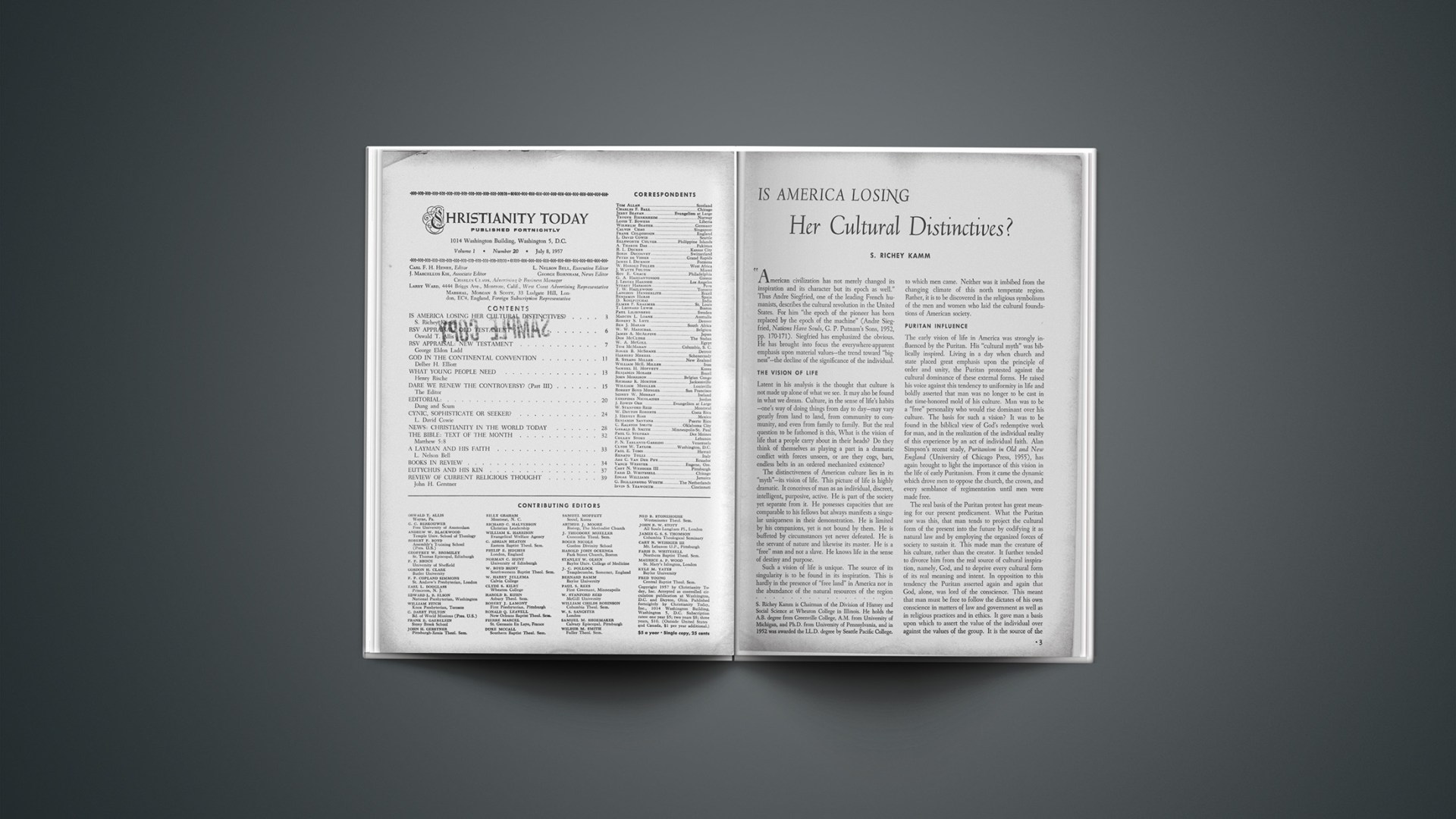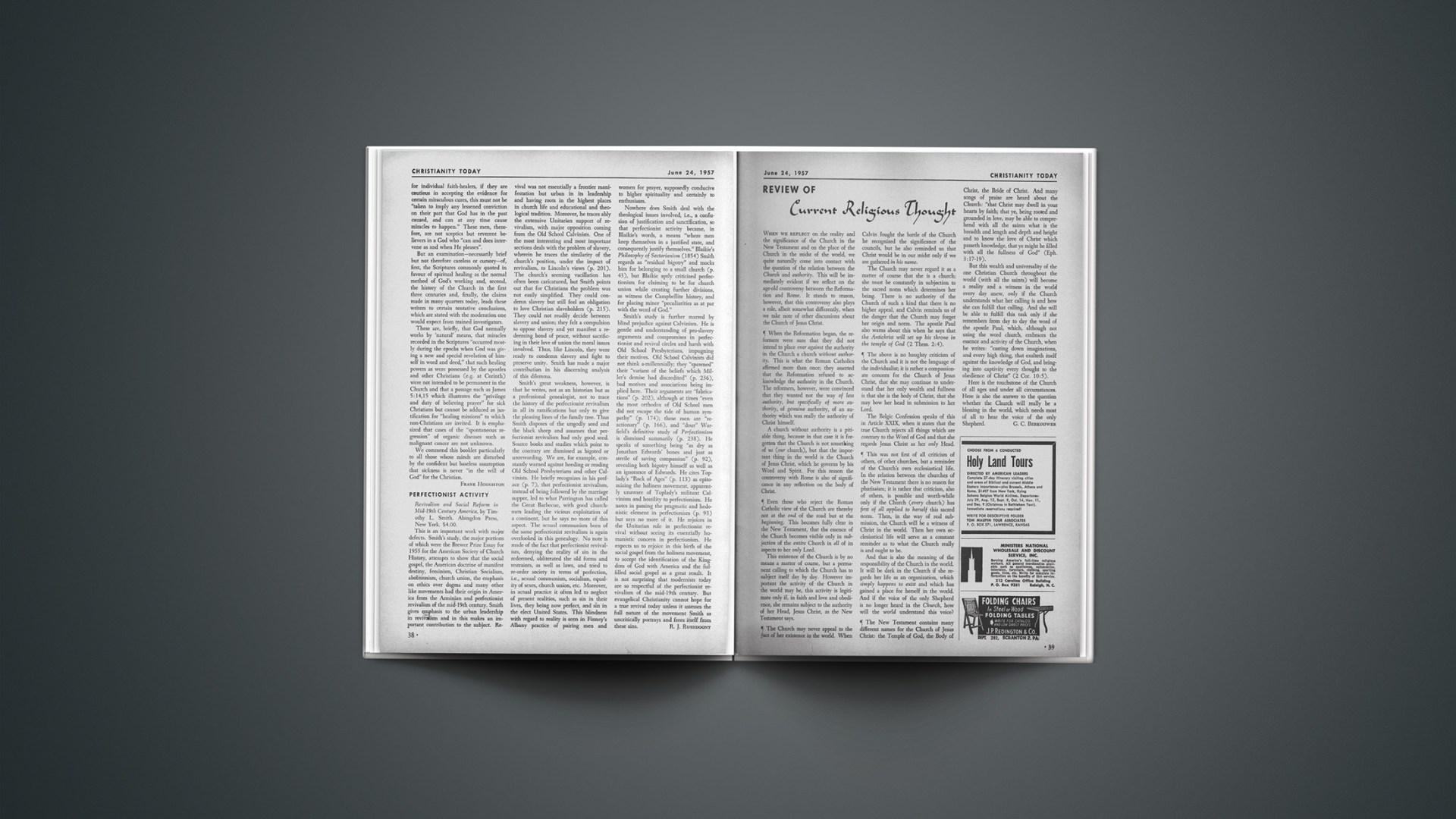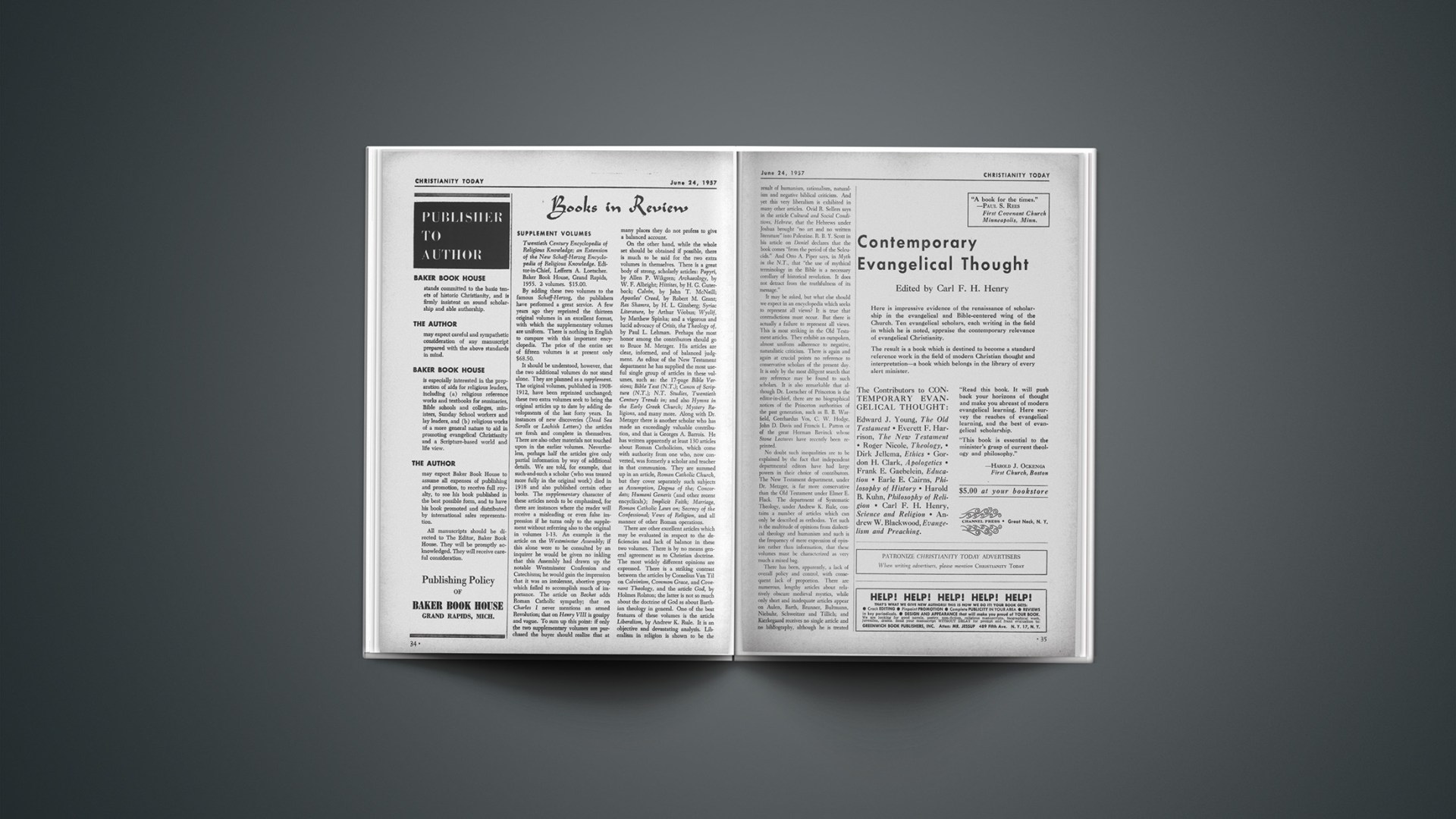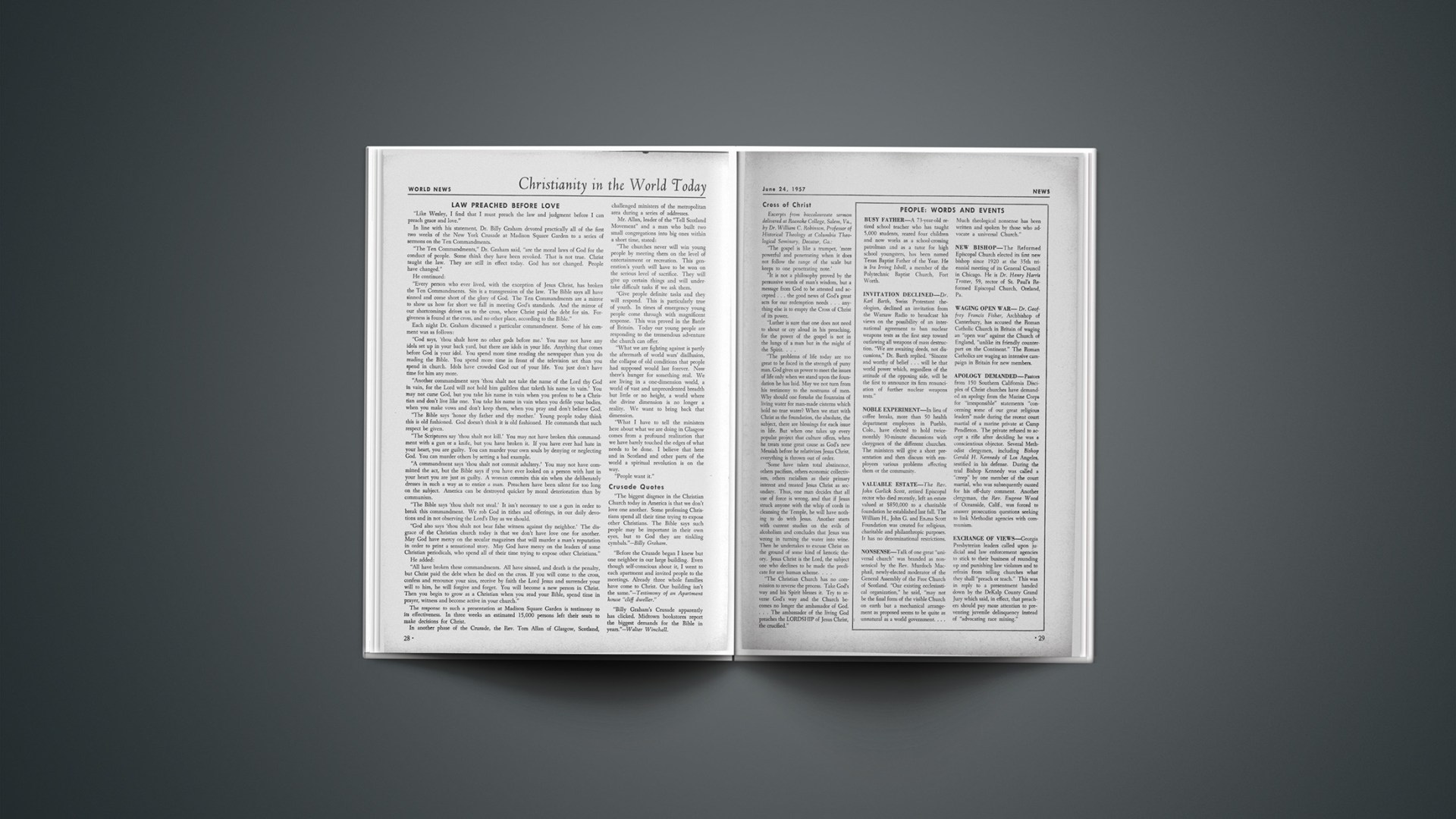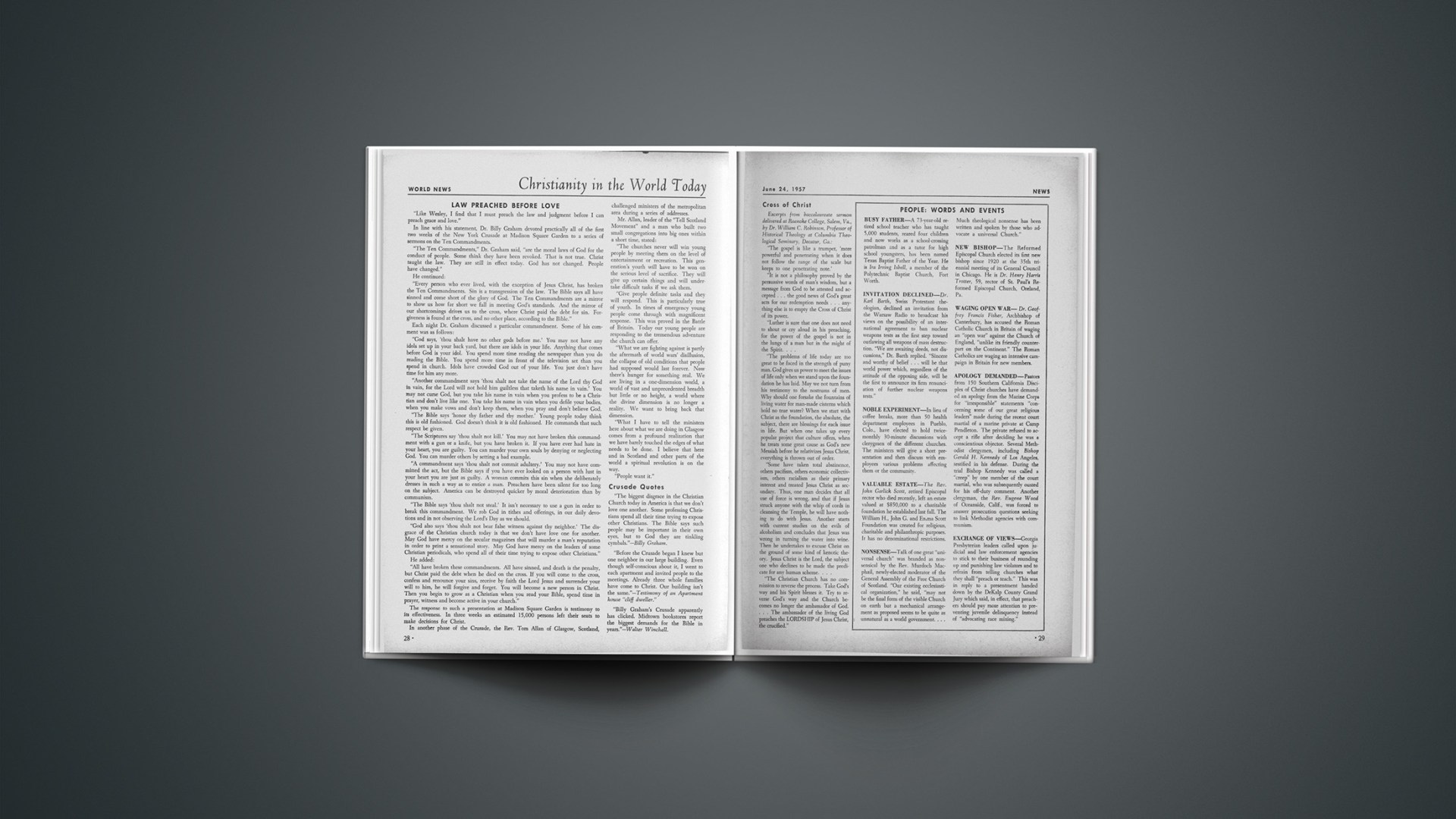The Revised Standard Version has now been with us long enough so that most people, both laymen and scholars, have formed their basic judgment of the work. Therefore the purpose of the present brief article is not so much to shed new light upon a question already exhaustively studied as to attempt to clarify some basic issues by suggesting several principles fundamental to a philosophy of translation and by offering a brief evaluation of the RSV in the light of these principles.
The Need For A Clean Bible
First, the Bible must be a revealing book. In evangelical Christianity, the Bible plays an indispensable role, for it is the divinely appointed instrument to bring men into a knowledge of truth and an experience of God. Since the English Bible is above all else a book of the layman, it must be rendered in an up-to-date, completely intelligible idiom. This principle is reinforced by the historical fact, realized only in this century, that the Greek idiom of the New Testament is the koine, the vernacular, the living language of common people.
However, a paradoxical situation has prevailed in large areas of the English-speaking church. The King James, or Authorized, Version, which has been the Bible of the people, is written in an archaic Elizabethan idiom. Such verses as “we which are alive … shall not prevent them which are asleep” (1 Thess. 4:15), “take nothing for their journey … no scrip” (Mk. 6:8), “and from thence we fetched a compass” (Acts 28:13), “we do you to wit” (2 Cor. 8:1), “I would have you … simple concerning evil” (Rom. 16:19), “his wife also being privy to it” (Acts 5:2) demand explanation to be understood in the twentieth century.
Furthermore, the form of the Bible, as well as its language, should convey to the reader a maximum degree of meaning. Few modern books would sell if every third line or so were indented as is KJV. A literary form that indicates units of thought by the use of paragraphs, sets off quotations by quotation marks, arranges poetical materials in poetic form and uses a modern system of punctuation is mandatory.
Punctuation and paragraph indention indeed involve interpretation, and the decisions of any translator or translators can be challenged at many points because of the ambiguity of the data. For instance, it is debatable whether our Lord’s discourse in John 3 ends at verse 15 or at verse 21. Nor can it be decided with finality whether the last sentence of Revelation 19:10 was spoken by the angel or is an author’s comment.
We must conclude, however, that the RSV, as far as language and form are concerned, will introduce the reader to the truth of the Word far more effectively than either of the earlier versions.
Accuracy In Translation
A second quality necessary in a translation of the Bible is accuracy. The meaning of the original language must be carefully reproduced. We cannot emphasize too strongly that a literal translation, if by literal we mean a word-for-word equivalent, is impossible. Anyone who has had any experience with a foreign language knows that every language has its idiom, which is meaningless when rendered with wooden literalness. We cite only one illustration. Many a preacher has been unhappy with the English word “bowels” of KJV (see 2 Cor. 6:12, Phil. 2:1, etc.) to express affection or compassion. KJV really embodies a mistranslation, for the Greek word physiologically denotes the organs above, not below, the diaphragm. To render this word “literally” is literally nonsense in English. The Semites may speak of the liver as a center of grief (Lam. 2:11), and the Greeks of the higher organs as a center of deep feeling; English demands a different idiom.
This problem of idiom appears in such theologically significant passages as Hebrews 1:2 “God … hath … spoken unto us by his Son” (KJV). The divergent rendering, “God … has spoken to us by a Son” (RSV), should be understood against the background of syntax rather than that of theology. The Greek literally reads, “God … has spoken to us in Son,” having neither the possessive pronoun nor the article. The translator here must deal with the problem of reproducing the anarthrous use of the article for which there is no English equivalent. If RSV undertranslates it, KJV overtranslates the idiom. Strict literalness is impossible.
The translator therefore must interpret. He must know the meaning of the original and seek its equivalent value in a different language. He must be a scholar possessing first-rate historical and philological equipment. No amount of devotion or piety can be a substitute for knowledge and technical skill, for we are dealing with historical facts which sometimes become very complex. However, when the interpretative element has been recognized, we must insist that a translation ought to be as literal as possible.
To what extent has RSV attained accuracy of translation? Numerous renditions of the new version are more literal than KJV. Any one of these, by itself, is of little importance; but taken together, they reflect the effort of the translators to produce an accurate version. “When they wanted wine” (John 2:3) is corrected to “when the wine failed.” RSV rightly reads “for the sake of your tradition” at Matthew 15:3 rather than “by your tradition.” KJV renders a single word in two ways in Matthew 23:16 and 18: “he is a debtor,” “he is guilty,” while RSV consistently translates the same word in the same way, “he is bound by his oath.” RSV literally renders Luke 10:11 “know this” instead of the paraphrastic “be ye sure of this.” “The common people” in Mark 12:37 (KJV, ASV) injects an unnecessary element of interpretation for the Greek, “the great throng,” which is faithfully reproduced in the RSV.
Furthermore, we may cite almost innumerable passages where the new version has achieved a better translation because it is more meaningful and perspicuous. This is probably its most notable feature, for many passages will suddenly come to life to the ordinary reader which have lain unnoticed before. Other passages will be seen in an entirely new light. The rudimentary credal statement in 1 Corinthians 15:3 ff. is “of first importance” (RSV), not merely of chronological priority (“first of all” KJV). Romans 7:6 is not making a contrast, as KJV suggests, between a literal and a spiritual approach to the Scriptures, but between two dispensations, a fact which the RSV makes clear. The confusing expression of KJV in Galatians 2:20 that the believer is crucified and yet lives is corrected in RSV to “I have been crucified with Christ; it is no longer I who live …” The almost meaningless wording of KJV of Colossians 2:23, “not in any honour to the satisfying of the flesh” is clarified by the rendition, “they are of no value in checking the indulgence of the flesh”; and a footnote indicates that the passage is subject to a variant translation.
Theological Accuracy
An important question for evangelicals is the theological accuracy of the RSV. The charges have repeatedly been made that RSV reflects a liberal theological tendency and that the translators have misrepresented the original text in favor of lower theological positions. A critical study of RSV does not bear this out. There are verses which at first sight may seem to involve theological presuppositions of a nonevangelical character; but a thorough study will reveal that in practically every case there are objective factors which enter into the language or context of the problem so that the evidence does not look in a single direction. That a theologically inferior rendition is not due necessarily to a liberal tendency of the translator is proved by the rather surprising “maiden” in Matthew 1:23 in the early edition [1937] of the Williams’ translation published by the Moody Press.
There are in fact many passages where RSV has a higher theology than KJV. RSV rendering “on a level place” instead of the KJV’s “in the plain” (Luke 6:17) helps to solve the problem of the apparent conflict between Matthew and Luke as to the scene of the Sermon on the Mount. In the important saying of Matthew 11:27, the new wording “chooses to reveal him” sets off to better advantage than KJV’s “will reveal him” the mediatorial, revelatory work of the Son. The sense of the miraculous in our Lord’s healing ministry is heightened by such a rendering as “instantly” (Matt. 15:28) instead of the more literal “from that very hour.” A new rendering of our Lord’s prayer, “glorify thou me in thy own presence” (John 17:5) affirms more definitely than KJV that Jesus is returning to the Father.
A very commendable feature of the RSV is the tendency to capitalize “spirit.” Many passages are thus attributed to the Holy Spirit which were not clearly designated in the earlier versions (see Matt. 22:43, Rom. 7:6, 2 Cor. 3:8, Rev. 4:2). The dissatisfaction created by the equivocal rendering of ASV in 2 Timothy 3:16 has been removed by a translation which closely resembles KJV and clearly affirms the inspiration of the Scriptures.
Other renditions are disappointing. RSV, in contrast to its predecessors, punctuates Romans 9:5 so as to apply the beatitude to God the Father rather than to Christ as God. The context hardly calls for the benediction that results in the RSV. At the same time, we must be hesitant of attributing this rendition to theological presuppositions, for it is a fact that while Paul assigns to Christ the prerogatives of deity, it is not his custom to attribute to him the word “God.” In our judgment, the old rendering is preferable, but it remains possible that RSV has it correctly translated.
Profound theological implications are involved in the decision of the revisers to render hilasterion by “expiation” rather than “propitiation” in Romans 3:25. This is not to attribute the decision merely to theological preference; only those who shared the immediate labors of the committee are in a position to know to what extent this may be true. We must, however, point out that in contemporary theological literature, the word “expiation” involves a far lower view of atonement than does “propitiation.” Indeed, our very concept of God is involved. Expiation looks manward and involves the blotting out of sins and the annulment of guilt. Propitiation looks Godward and includes more than expiation—the satisfaction of God’s holiness and of his wrath against sin.
Far more is involved, however, than an arbitrary and subjective decision between two views of the atonement. Extensive technical and philological study lies behind the translation of hilasterion, particularly in the researches of C. H. Dodd. The conclusions of technical scholarship are not answered by the charge of theological liberalism, but only by scholarly research of equal competence. This we now fortunately possess in the work of Leon Morris, The Apostolic Preaching of the Cross, [see the review by the writer in CHRISTIANITY TODAY, Vol. I, No. 1, (Oct. 29, 1956), p. 37] who shows that “expiation” is less than the Scriptures teach and is therefore unsatisfactory.
Perhaps the most radical departure of the new version involving theological considerations is the abandonment of the archaic “thee” and “thou” in favor of the idiom of today. Many readers have felt that the Bible has become somehow less holy and distinctive because of this change. What they fail to realize is that “thee” and “thou” was the ordinary language of everyday life when KJV was made and not a distinctive religious idiom. The decision to employ the modern idiom, we are informed in the introductory brochure, was reached only after two years of debate and experiment when it was decided that the formal mode of address should be retained only when deity was being addressed.
Are we to conclude, then, that when our Lord is not addressed in this formal terminology, it is because the translators do not look upon him as divine? This conclusion does not follow. The question which must be decided in each instance is whether men were consciously addressing Jesus as deity. We must recognize in the complexity of the messianic self-disclosure that only after the resurrection and ascension did the disciples come to a full recognition of our Lord’s deity. To put into their mouths a uniform terminology which recognizes deity from the start is to ignore the historical facts of the self-revelation of Christ and the education of the disciples. With the basic principle decided upon by the revisers, we may agree; and we note that the deity of the promised Messiah is recognized in Matthew 22:44, Hebrews 1:5–13, 5:5, 6, 7:17, 21, and that of the exalted Christ in Revelation 5:9.
The effort of the translators to carry out this principle may be illustrated in Acts 9 where Saul, who was apparently as yet unsure of the identity of the heavenly being appearing to him, says, “Who are you, Lord?” (Acts 9:5), while Ananias, who was fully aware of the Lord’s identity, says, “thy saints at Jerusalem” (Acts 9:13). The handling of these two situations reflects a nicety of judgment. When this has been said, we must record dissatisfaction with the rendering of such high Christological passages at Matthew 16:16, John 6:69. Furthermore, in the light of Thomas’s confession in John 20:28, a higher form of address might be expected in John 21, although it is of course possible that only Thomas had as yet grasped the significance of his confession. However, criticism, if any, must be directed to the revisers’ judgment, not to their theological presuppositions.
Consistency In Translation
A third important principle is derived from the fact that the vast majority of people are shut up to an English version for their knowledge of the Word of God. Therefore, a good version must provide an adequate tool for serious Bible study, and must endeavor to achieve as large a measure as possible of consistency in rendering of both important and unimportant theological words. Literary excellence may demand variety; but serious study demands consistency and accuracy.
It is evident that the translators of the new version have aimed at such consistency, at least in the New Testament. The single Greek expression, aionios zoe, which occurs some forty-four times in the New Testament, is rendered in KJV by the two phrases, “eternal life” and “everlasting life,” at a ratio of two to one (cf. John 3:15, 16; Acts 13:46, 48; Rom. 6:22–23). The RSV is consistent in employing a single English phrase. A similar meaningless variation between “everlasting” and “eternal” is found in KJV for the adjective aionios. Does one word convey a qualitative significance and the other only a quantitative meaning? To ask the question is to answer it.
Another even more important illustration is to be found in the RSV’s happy rendition of the word aion which refers to the entire period of human history in contrast with “the age to come” when the fullness of God’s kingdom will be realized (see Mark 10:30, Matt. 13:39–43). The KJV obscures this basic biblical structure by the rendering “world.” This confuses the student of the English Bible, for there is another word for world, kosmos, which embodies a closely related concept but suggests a different emphasis. RSV in twenty places correctly translates aion by “age.” In two other places, a footnote indicates the Greek word (Luke 16:8, Rom. 12:2). In other passages, such as Matthew 13:22, Mark 4:19, 2 Corinthians 4:4, 1 Timothy 6:17, 2 Timothy 4:10 and Titus 2:12, RSV retains “world,” apparently because the translators concluded that such was the meaning in these passages. Undeniably, sometimes aion and kosmos appear to be quite interchangeable; but in our opinion, nothing is lost, and the Bible student would be assisted by the retention of “age.”
The Greek words, hades and gehenna, involve distinct concepts which are obscured by the indiscriminate rendering “hell” in KJV (except in 1 Cor. 15:55, where hades is rendered “grave”). RSV differentiates the terms by the use of “hades” and “hell” except in Matthew 16:18 where a footnote indicates the Greek word.
In its translation of diatheke, KJV alternates between “covenant” (20 times) and “testament” (13 times). The new version consistently translates the word “covenant” except in Hebrews 9:16 where the covenant in question is a will. Here a footnote indicates the Greek word.
Many students of the English Bible will miss the word “to impute” in Romans 4:6, 8, 11, 22–24. However, this probably reflects no theological tendency but merely another instance of consistency of rendering. The same Greek word is rendered in KJV “to count” in Romans 4:3, 5 and “to reckon” in Romans 4:4, 9, 10. Since the meaning “to reckon” is closest to the Greek word, RSV consistently renders it in all of these references. The same rendering should appear in 2 Corinthians 5:19, where the RSV has “to count.”
These few illustrations, which have been deliberately chosen more or less at random to give fair samplings, adequately illustrate the measure of consistency sought and attained by the new version. Some of the illustrations cited are important for doctrinal study while others bear little doctrinal significance. The latter are all the more important in serving to demonstrate that a real effort has been made to introduce a large measure of consistency in translation. This feature will be of immeasurable aid to the student who is limited to the English Bible. There is still room for improvement, and it is to be hoped that future editions of RSV will seek an even greater measure of uniformity wherever the context permits.
Preserving The Familiar
A fourth principle introduces an element that limits the application of those already set forth. The Bible belongs to the Church and has created a tradition in English literature and in Western civilization which cannot be ignored. The King James Version is an English classic of great beauty. Furthermore, it has been the Bible of the people, and our minds are stocked with its verses and phrases. Therefore, for the sake both of beauty and practical usage, a new translation should be conservative, retaining as much of the familiar idiom as possible. Never should changes be made for the sake of change. Accuracy and clarity are mandatory, but these principles must be combined with that of the conservation of the accepted standard. Our need is not for a new version but for an adequate revision of the old that will conserve its beauty but correct its defects.
Not infrequently the translators of RSV seem to have failed to recognize this principle. A few illustrations must suffice. The first verses of John 14 are deeply ingrained in the minds of multitudes of Christians, and something seems to have been sacrificed in the new rendering. We may admit that “mansions” needs a modern equivalent, and that there are textual grounds for the structure of the second verse even though the resultant translation creates the difficulty of supposing that Jesus had previously told the disciples that He was going to prepare a place for them. Nevertheless the changes from the indicative to the imperative, from “and if I go” to “and when I go,” from “receive you unto myself” to “take you to myself” are neither required by the text nor by the meaning of the passage. “If I give away all I have” (1 Cor. 13:3, RSV) is hardly an improvement over “though I bestow all my goods to feed the poor.” The change in the order of phrases in John 3:17 is quite uncalled for. “Satisfied” in the fourth Beatitude (Matt. 5:6, RSV) does not add enough to merit the change from “filled.” Illustrations could be added endlessly.
Furthermore, desire for modernity in language ought not to be carried to the point where fundamental theological terminology is sacrificed. The avoidance of such terms as “sanctification” in favor of “consecration,” [later editions of RSV have restored “sanctification” in some places] or “predestination” in favor of “destined” (Eph. 1:5, 12) renders a disservice to the Church. Christian people should become familiar with basic theological terminology by reading the Bible itself. Therefore, so far as possible, theological terms should be consistently rendered by equivalent theological terms in English. Here the RSV is defective.
RSV frequently makes interpretative changes in the traditional language where clarity demands no change. “Those who are entering” (Matt. 23:13) does not need the addition of the word “would.” It is quite unnecessary to change Matthew 24:48, “If that evil servant shall say in his heart” to “says to himself,” especially since this idiom is elsewhere preserved (Mark 2:6, Luke 2:19, 3:15, 5:22). John 3:12, “How shall ye believe,” does not need the alteration to “How can you believe.” The change in John 15:2 from “every branch in me” to “every branch of mine” is distinct loss. “In that day you will ask me nothing” (John 16:23) is quite as significant as “you will ask me no questions.” In 1 Corinthians 2:10, the literal “deep things of God” is superior to “the depths of God,” which suggests something in the being of God rather than the depths of God’s revealed truth.
These illustrations suffice to demonstrate that RSV has an unhappy tendency to seek novelty for its own sake. The work would have been far more useful had the translators endeavored to retain as much of the language of the familiar version as possible. Nevertheless, it is this writer’s judgment that while the New Testament of the RSV is liable to serious criticism, and has not yet provided us with a completely adequate version, it is the most useful translation we possess.
END
A Canadian by birth, George Eldon Ladd holds the Th.B. degree from Gordon College, B.D. from Gordon Divinity School, and Ph.D. from Harvard University. Since 1950 he has served on the faculty of Fuller Theological Seminary. He is author of Crucial Questions About the Kingdom of God (1952) and The Blessed Hope (1956).

